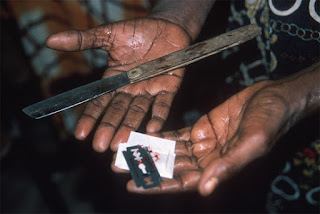War Against Female Genital Mutilation(FGM) in Africa
Africa has a multicultural society with innumerable tribes and ethnic groups enriched with diverse customs that are unique to them throunghout the continent.
However, some of these customs and traditions such as Female circumcision has been a prevalent issue in most parts of Africa, which has over the years availed Africans no progress, rather inflicted excruciating agony in the lives of young African girls and women.
Many girls barely into their adolescence have been and are still subjected to one of the more severe forms of Female Genital Mutilation - a practice long carried out in many African countries, like Senegal, Mali, Djibouti,Sierra leone Nigeria,Somalia etc.
In these places where it's been practised, FGM is considered an essential part of raising a girl and preparing her for womanhood and marriage. With its direct link the beliefs about premarital virginity and marital fidelity, the social pressure to adhere to the practice is intense.
A study of Child's Rights and development organization Plan Int'l in Mali in 2010, found more than half of all fathers and 1/3 of mothers wanted their girls excised. For such families, its a seal of guarrantee that secures girls against any sexual encounter prior to marriage and protects the family honour.
In spite of the plethora of factors triggering this practise, there aren't any benefits associated with FGM; in fact, female circumcision before and after leads to several unwanted complications related to the natural bodily functions of girls and women. Thousands of girls every year suffer health complications including severe vaginial pain, shock, bleeding and infection. Life long consequences include infidelity, low libido, psychological trauma, childbirth complications and newborn deaths inter alia.
From verbal threats and physical force, all kinds of methods are used to coerce unwilling girls into submission. In some urban areas, the surgery is even conducted on new born girls before they are 40days old. Recently, 13years old Soheir Albbatea died in a clinic in Egypt when a doctor was performing the procedure. The girl's death has caused an uproar in the country where FGM legally has been banned but still widely practised, affecting more than 2/3 of women there.
The practice violates a number of fundamental rights outlined under International Protocols.
In July, 2003, the African Union adopted Maputo Protocol promoting women's rights and calling for an end of FGM. The agreement came into force in November 2005, and by December 2008, 25 member countries had ratified it.
As of 2013, according to a UNICEF report, 24 African countries have legislations or decrees against FGM/C practice.
In 2015, Gambia's president Yahya Jammeh has banned FGM.
Despite many African countries signing up to international legal frameworks to protect children, traditional laws governing customary practices often override such treaties. But then, through awareness, empowerment and education in areas where it's been practised will bring about eradication campaigns which will go a long way in changing their views on FGM.
Again, engaging with young people besides parents and elders is a key part of our approach.
For the sake of our daughters from whose eyes beam promising tomorrow and who brings seeds of change, let's continue to work at home, through the social media, and other available mediums to put an end to FGM.
Support the fight of this scourge.





No comments:
Post a Comment